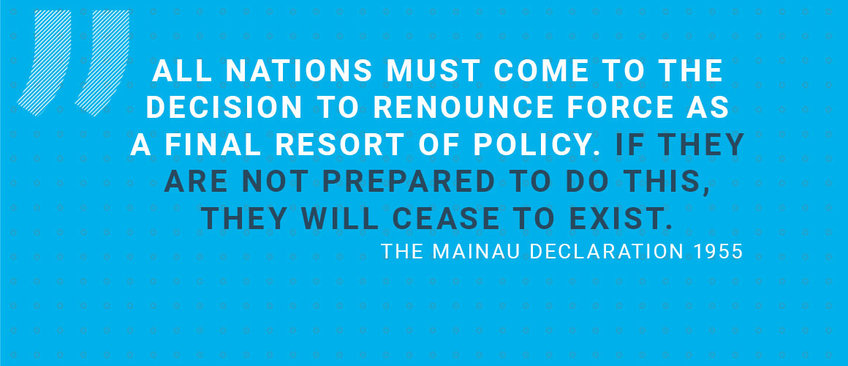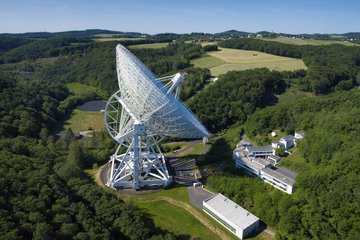Call for Peace
150 Nobel Laureates from various disciplines are calling for peace in the face of the war in Ukraine emanating from Russian soil. They have signed a declaration initiated by the Max Planck Society and supported by the Lindau Nobel Laureate Meetings.

The Declaration follows on from the 1955 Mainau Declaration against the use of nuclear weapons (pdf). It was co-initiated by Otto Hahn, 16-time participant of the Lindau Conferences and first President of the Max Planck Society, at the 5th Lindau Nobel Laureate Conference. The current declaration states: "The discovery of nuclear fission created the basis for the construction of nuclear weapons of destruction. Their current volume has the potential to make the Earth uninhabitable for humans and to wipe out human civilisation. Such weapons must therefore never be used."
The 150 signatories call on governments and business leaders to use scientific knowledge and technologies responsibly and with awareness of their long-term consequences. Russian President Vladimir Putin is urged to respect international legal agreements, recall his forces, start negotiations and establish peace.
The Lindau Nobel Laureate Meetings and the Max Planck Society are convinced that science must continue the dialogue even if politics remains silent, or fights. With this comes the hope that this initiative, along with countless others, will soon lead to a return to peaceful exchange between nations.
Munich – 28 February 2022 (updated on 21 March 2022)
Declaration 2022
Call for Peace from the International Scientific Community by Nobel Laureates
In the view of war emanating from Russian soil and the explicit threat of nuclear weapons, we, Nobel laureates in science, economics, literature, and peace have decided to make this appeal to government leaders.
While we, as scientists, have no political mandate, we are aware of the power that the knowledge we have gained conveys to governments and political actors.
After all, findings and technologies from scientific research and development have made humans the greatest shaping force in the Earth’s system over the last century. The discovery of nuclear fission created the basis for the construction of nuclear weapons of destruction. Their current volume has the potential to make the Earth uninhabitable for humans and to wipe out human civilisation. Such weapons must therefore never be used!
We as scientists are convinced that scientific knowledge of all disciplines and the technologies based on it will bring the greatest benefit to humanity in the future. They can only be achieved through worldwide scientific cooperation. Without them, global problems cannot be solved. The prerequisite is that these findings are used exclusively for peaceful purposes and for the well-being and happiness of all people, while respecting the Universal Declaration of Human Rights.
We therefore call on governments and business leaders to use scientific knowledge and technologies responsibly and with awareness of their long-term consequences. Only in this way can human civilisation continue to develop in a respectful manner towards nature and the Earth’s system in the future. The fundamental principles of the United Nations Charter on the Peaceful Coexistence of Peoples are the prerequisite for our work across borders for the benefit of the Earth and its people.
We call on Russian President Vladimir Putin to respect the agreements under international law, to recall his armed forces, to start negotiations and to establish peace.
The following Nobel Laureates have signed the declaration:
Prof. Dr. Peter Agre, Johns Hopkins Malaria Research Institute, Baltimore, USA
Prof. Dr. James P. Allison, The University of Texas, Houston, USA
Prof. Dr. Harvey J. Alter, National Institute of Health, Bethesda, USA
Prof. Dr. Hiroshi Amano, Nagoya University, Japan
Prof. Dr. Dres. h.c. Werner Arber, Universität Basel, Switzerland
Prof. Dr. Frances H. Arnold, California Institute of Technology, Pasadena, USA
Prof. Dr. Barry C. Barish, California Institute of Technology, Pasadena, USA
Prof. Dr. Françoise Barré-Sinoussi, Institut Pasteur, Paris, France
Prof. Dr. J. Georg Bednorz, IBM Research GmbH, Rüschlikon, Switzerland
Prof. Dr. Bruce A. Beutler, UT Southwestern Medical Center at Dallas, USA
Prof. Dr. Gerd K. Binnig, Germany
Prof. Dr. Elizabeth H. Blackburn, University of California, San Francisco, USA
Prof. Dr. Michael S. Brown, The University of Texas, Dallas, USA
Prof. Dr. Linda B. Buck, Fred Hutchinson Cancer Research Center, Seattle, USA
Prof. Dr. Mario R. Capecchi, University of Utah, Salt Lake City, USA
Prof. Dr. Thomas R. Cech, University of Colorado Boulder, Boulder, USA
Prof. Dr. Martin Chalfie, Columbia University, New York, USA
Prof. Dr. Emmanuelle Charpentier, Max-Planck-Forschungsstelle für die Wissenschaft der Pathogene, Berlin, Germany
Prof. Dr. Steven Chu, Stanford University, USA
Prof. Dr. Aaron Ciechanover, Technion - Israel Institute of Technology, Haifa
J. M. Coetzee, Adelaide, Australia
Prof. Dr. Elias J. Corey, Harvard University, Cambridge, USA
Prof. Dr. Robert F. Curl Jr., Rice University, Houston, USA
Sir Angus S. Deaton, Princeton University, USA
Prof. Dr. Johann Deisenhofer, University of Texas Southwestern Medical Center, Dallas, USA
Baron François Englert, Université Libre de Bruxelles, Belgium
Prof. Dr. Gerhard Ertl, Fritz-Haber-Institut der Max-Planck-Gesellschaft, Berlin, Germany
Prof. Dr. Ben L. Feringa, University of Groningen, Netherlands
Prof. Dr. Albert Fert, Université Paris-Sud, France
Prof. Dr. Joachim Frank, Columbia University, New York, USA
Prof. Dr. Jerome I. Friedman, MIT Massachusetts Institute of Technolgy, Cambridge, USA
Sir Andre K. Geim, University of Manchester, UK
Prof. Dr. Reinhard Genzel, Max-Planck-Institut für extraterrestrische Physik, Garching, Germany
Prof. Dr. Andrea Ghez, University of California, Los Angeles, USA
Prof. Dr. Sheldon L. Glashow, Boston University, USA
Prof. Dr. Carol W. Greider, University of California, Santa Cruz, USA
Prof. Dr. F. Duncan M. Haldane, Princeton University, USA
Prof. Dr. John L. Hall, University of Colorado, Boulder, USA
Prof. Dr. Oliver Hart, Harvard University, Cambridge, USA
Prof. Dr. Klaus Hasselmann, Max-Planck-Institut für Meteorologie, Hamburg, Germany
Prof. Dr. med. Dr. h.c. mult. Harald zur Hausen, Deutsches Krebsforschungszentrum, Heidelberg, Germany
Prof. Dr. James J. Heckman, The University of Chicago, USA
Prof. Dr. Alan J. Heeger, University of California, Santa Barbara, USA
Prof. Dr. Richard Henderson, MRC Laboratory of Molecular Biology, Cambridge, UK
Prof. Dr. Dudley R. Herschbach, Harvard University, Cambridge, USA
Prof. Dr. Avram Hershko, Technion - Israel Institute of Technology, Haifa
Prof. Dr. Michael Houghton, University of Alberta, Edmonton, Canada
Prof. Dr. Roald Hoffmann, Cornell University, Ithaca, USA
Prof. Dr. Jules A. Hoffmann, Université de Strasbourg, France
Prof. Dr. Bengt R. Holmström, MIT Massachusetts Institute of Technology, Cambridge, USA
Prof. Dr. Tasuku Honjo, Kyoto University Graduate School of Medicine, Japan
Prof. Dr. H. Robert Horvitz, MIT Massachusetts Institute of Technology, Cambridge, USA
Prof. Dr. Robert Huber, Max-Planck-Institut für Biochemie, Planegg-Martinsried, Germany
Sir Tim Hunt, Okinawa Institute of Science and Technology (OIST), Kunigami Gun, Japan
Prof. Dr. Louis J. Ignarro, University of California, Los Angeles, USA
Prof. Dr. Brian D. Josephson, University of Cambridge, UK
Prof. Dr. David Julius, University of California, San Francisco, USA
Prof. Dr. William G. Kaelin, Jr., Harvard Cancer Center, Boston, USA
Prof. Dr. Daniel Kahneman, Princeton University, USA
Prof. Dr. Takaaki Kajita, University of Tokyo, Japan
Tawakkol Karman, Tawakkol Karman Foundation, Istanbul-Avcilar, Turkey
Prof. Dr. Martin Karplus, Harvard University, Cambridge, USA
Prof. Dr. Wolfgang Ketterle, MIT Massachusetts Institute of Technology, Cambridge, USA
Prof. Dr. Klaus von Klitzing, Max-Planck-Institut für Festkörperforschung, Stuttgart, Germany
Prof. Dr. Brian K. Kobilka, Stanford University, USA
Prof. Dr. Roger D. Kornberg, Stanford University, USA
Prof. Dr. J. Michael Kosterlitz, Brown University, Providence, USA
Prof. Dr. Finn E. Kydland, University of California, Santa Barbara, USA
Prof. Robert B. Laughlin, Stanford University, USA
Prof. Dr. Yuan Tseh Lee, Academia Sinica, Taipei, Taiwan (China)
Sir Anthony J. Leggett, University of Illinois at Urbana-Champaign, USA
Prof. Dr. Jean-Marie Lehn, Université de Strasbourg, France
Prof. Dr. Michael Levitt, Stanford University, USA
Prof. Dr. Tomas Lindahl, Francis Crick Institute, London, UK
Prof. Dr. Benjamin List, Max-Planck-Institut für Kohlenforschung, Mülheim a.d. Ruhr, Germany
Mario Vargas Llosa, Lima, Peru
Prof. Dr. David MacMillan, Princeton University, USA
Prof. Dr. Rudolph A. Marcus, California Institute of Technology, Pasadena, USA
Prof. Dr. Eric S. Maskin, Harvard University, Cambridge, USA
Prof. Dr. John C. Mather, NASA, Greenbelt, USA
Prof. Dr. Michel Mayor, Universitè de Genève, Switzerland
Prof. Dr. Arthur B. McDonald, Queen's University, Kingston, Canada
Prof. Dr. Craig C. Mello, University of Massachusetts Medical School, Worcester, USA
Prof. Dr. Hartmut Michel, Max-Planck-Institut für Biophysik, Frankfurt am Main, Germany
Prof. Dr. William E. Moerner, Stanford University, USA
Prof. Dr. Edvard I. Moser, Norwegian University of Science and Technology, Trondheim, Norway
Prof. Dr. May-Britt Moser, Norwegian University of Science and Technology, Trondheim, Norway
Prof. Dr. Ferid Murad, Stanford University, Palo Alto Veterans Medical Center, USA
Prof. Dr. Roger B. Myerson, The University of Chicago, USA
Prof. Dr. Shuji Nakamura, University of California, Santa Barbara, USA
Prof. Dr. Erwin Neher, Max-Planck-Institut für biophysikalische Chemie, Göttingen, Germany
Sir Konstantin S. Novoselov, National University of Singapore
Prof. Dr. Ryoji Noyori, Japan Science and Technology Agency, Tokyo
Sir Paul M. Nurse, The Francis Crick Institute, London, UK
Prof. Dr. Christiane Nüsslein-Volhard, Max-Planck-Institut für Entwicklungsbiologie, Tübingen, Germany
Prof. Dr. John O'Keefe, Sainsbury Wellcome Centre, London, UK
Prof. Dr. Satoshi Ōmura, Kitasato University, Tokyo, Japan
Prof. Dr. Giorgio Parisi, Sapienza Università di Roma, Italy
Prof. Dr. Arno A. Penzias, New Enterprise Associates, Menlo Park, USA
Prof. Dr. Saul Perlmutter, University of California, USA
Prof. Dr. Edmund S. Phelps, Columbia University, New York, USA
Prof. Dr. William D. Phillips, National Institute of Standards and Technology (NIST), Gaithersburg, USA
Sir Christopher A. Pissarides, The University of London, UK
Prof. Dr. John C. Polanyi, University of Toronto, Canada
Prof. Dr. David H. Politzer, California Institute of Technology, Pasadena, USA
Prof. Dr. Didier Queloz, ETH Zürich, Switzerland
Dr. Venkatraman Ramakrishnan, MRC Laboratory of Molecular Biology, Cambridge, UK
Dr. José Ramos-Horta, Palacio das Cinzas, Dili, Timor-Leste
Sir Peter J. Ratcliffe, University of Oxford, UK
Prof. Dr. Charles M. Rice, The Rockefeller University, New York, USA
Prof. Dr. Adam G. Riess, Johns Hopkins University, Baltimore, USA
Sir Richard J. Roberts Ph.D. F.R.S., New England Biolabs, Inc., Ipswich, USA
Prof. Dr. Michael M. Rosbash, HHMI/Brandeis University, Waltham, USA
Prof. Dr. James E. Rothman, Yale University, New Haven, USA
Prof. Dr. Bert Sakmann, Max-Planck-Institut für Neurobiologie, Planegg-Martinsried, Germany
Kailash Satyarthi, Kailash Satyarthi Children's Foundation, New Delhi, India
Prof. Dr. Jean-Pierre Sauvage, Université de Strasbourg, France
Prof. Dr. Randy W. Schekman, University of California, Berkeley, USA
Prof. Dr. Brian P. Schmidt, The Australian National University, Canberra
Prof. Dr. Richard R. Schrock, MIT Massachusetts Institute of Technology, Cambridge, USA
Prof. Dr. Gregg L. Semenza, Johns Hopkins School of Medicine, Baltimore, USA
Prof. Dr. Phillip A. Sharp, MIT Massachusetts Institute of Technolgy, Cambridge, USA
Prof. Dr. William F. Sharpe, Stanford University, USA
Prof. Dr. Dan Shechtman, Technion - Israel Institute of Technology, Haifa, Israel
Prof. Dr. Robert J. Shiller, Yale University, New Haven, USA
Prof. Dr. George P. Smith, University of Missouri, Columbia, USA
Prof. Dr. Vernon L. Smith, Chapman University, Orange, USA
Prof. Dr. Joseph E. Stiglitz, Columbia University, New York, USA
Sir J. Fraser Stoddart, Northwestern University, Evanston, USA
Prof. Dr. Horst L. Störmer, Columbia University, New York, USA
Prof. Dr. Donna Strickland, University of Waterloo, Canada
Prof. Dr. Jack W. Szostak, Harvard Medical School, Boston, USA
Prof. Dr. Joseph H. Taylor, Jr, Princeton University, USA
Prof. Dr. Kip S. Thorne, Caltech - California Institute of Technology, Pasadena, USA
Olga Tokarczuk, Wrocław, Poland
Prof. Dr. Harold E. Varmus, Weill Cornell Medical College, New York, USA
Sir John E. Walker, University of Cambridge, UK
Prof. Dr. Arieh Warshel, University of Southern California, Los Angeles, USA
Prof. Dr. Rainer Weiss, LIGO MIT, Cambridge, USA
Prof. Dr. M. Stanley Whittingham, Binghamton University (SUNY), USA
Prof. Dr. Eric F. Wieschaus, Princeton University, USA
Prof. Dr. Torsten N. Wiesel, The Rockefeller University, New York, USA
Prof. Dr. Robert W. Wilson, Cambridge, USA
Prof. Dr. David J. Wineland, University of Oregon, Eugene, USA
Sir Gregory P. Winter, Trinity College, Cambridge, UK
Prof. Dr. Kurt Wüthrich, The Scripps Research Institute (TSRI), La Jolla, USA
Prof. Dr. Ada E. Yonath, Weizmann Institute of Science, Rehovot, Israel
Prof. Dr. Michael W. Young, The Rockefeller University, New York, USA
Muhammad Yunus, Yunus Centre, Dhaka, Bangladesh












